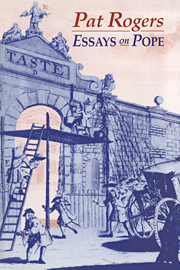Book contents
- Frontmatter
- Contents
- Preface
- Acknowledgements
- List of abbreviations
- 1 Pope and the syntax of satire
- 2 The politics of style
- 3 Form and pattern in the Pastorals
- 4 Windsor-Forest, Britannia and river poetry
- 5 Faery lore and The Rape of the Lock
- 6 Timon's Villa and Chatsworth
- 7 A drama of mixed feelings: the Epistle to Arbuthnot
- 8 The name and nature of Dulness: proper nouns in The Dunciad
- 9 Pope and the social scene
- 10 Blacks and poetry and Pope
- 11 The case of Pope v. Curll
- 12 Pope and his subscribers
- 13 The Burlington circle in the provinces: Pope's Yorkshire friends
- 14 Pope and the antiquarians
- Index
9 - Pope and the social scene
Published online by Cambridge University Press: 18 December 2009
- Frontmatter
- Contents
- Preface
- Acknowledgements
- List of abbreviations
- 1 Pope and the syntax of satire
- 2 The politics of style
- 3 Form and pattern in the Pastorals
- 4 Windsor-Forest, Britannia and river poetry
- 5 Faery lore and The Rape of the Lock
- 6 Timon's Villa and Chatsworth
- 7 A drama of mixed feelings: the Epistle to Arbuthnot
- 8 The name and nature of Dulness: proper nouns in The Dunciad
- 9 Pope and the social scene
- 10 Blacks and poetry and Pope
- 11 The case of Pope v. Curll
- 12 Pope and his subscribers
- 13 The Burlington circle in the provinces: Pope's Yorkshire friends
- 14 Pope and the antiquarians
- Index
Summary
Pope was a parvenu and an outsider. His enemies like to say so, and they were right in a deeper sense than they can have known. What particularly angered the dunces, it has been said, was the fact that Pope had ‘ made a fortune by literature and [was] thus free of the captivity they [were] enslaved to’. There is a massive irony here, for Pope was peculiarly disadvantaged when he started out. He did not have it made for him. In retrospect, it is easy to suppose that great writers were bound to come through – that Alfred Tennyson was always Lord Tennyson, prosperous, secure and famous. It is a misleading assumption in general, and a wild distortion in the case of Pope. He inherited one disability, Catholicism. And within a few years he had contracted another in the shape of Pott's disease, which left him a crippled dwarf. Either would have been enough to set him outside ordinary society: to limit his educational opportunities, to curtail his civic responsibilities, to blight his prospects. If we want to understand Pope's own social situation, we must give full weight to these two handicaps against which he pitted his will and his talent.
Of the two, his physical disability is the easier to allow for today. Much more strange to us is the slur involved in belonging to the Catholic faith. This was not just a matter of popular attitudes. It was an affair of the statute-book. After the heady innovations of James II, there was no likelihood that Williamite ‘toleration’ would extend to accepting papists as fully paid-up members of society.
- Type
- Chapter
- Information
- Essays on Pope , pp. 129 - 167Publisher: Cambridge University PressPrint publication year: 1993

